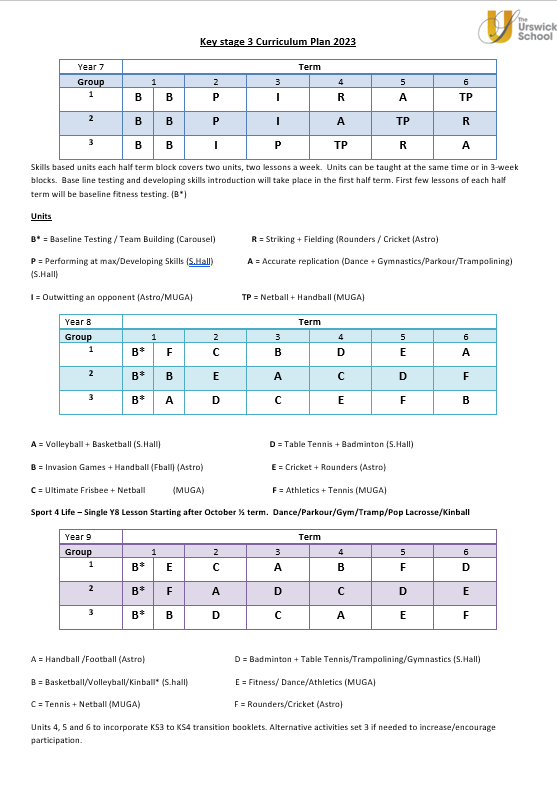- Home
- Curriculum
- Subjects
- Physical Education
Physical Education
The intent of Physical Education at The Urswick School is to provide all students with a high-quality curriculum that is broad and balanced.
Our curriculum is designed to provide pupils with the opportunity to experience a wide range of sports and activities, whilst aiming to supply them with the necessary skills and knowledge to be physically active. The curriculum is also designed in order to help maintain, improve and encourage a healthy active lifestyle whilst stimulating their enjoyment of the physical activity.
Whilst pupils take part in PE lessons they are also given the opportunity to take part in competitive sports and activities outside of school through our out of hours provision and inter-form competitions. We also have external coaches who deliver high quality out of hours provision for our students both at KS3 and KS4.
Key Stage 3
In year 7 pupils will take part in a wide range of sports and physical activities, to enhance their self-confidence and encourage them to have fun. They will take part in activities such as gymnastics, dance, athletics and learn the basic the fundamental skills such as passing, dribbling, and shooting for example in a variety of sports, along with rules and regulations. Pupils are also assessed using baseline fitness testing and are taught the importance of exercise and extracurricular activities on our health.
Year 8 pupils will then progress onto developing the skills that they learnt in year 7 and competency by applying these into competitive games and scenarios. This year will also allow pupils to focus on their ball control.
This is then progressed in year 9 by students applying more advanced skills, using higher level content and terminology whilst looking at tactics and strategies to outwit their opponents. Pupils will also evaluate their performance focusing on strengths and weaknesses.
We also engender an understanding of what it means to have a healthy lifestyle – including physical activity, developing social skills and how PE can impact emotional well-being positively – throughout Key Stage 3 and in Core PE at Key Stage 4. At KS3 this is implemented into the Health and Wellbeing curriculum.
The physical education curriculum focuses on broadening knowledge, skills and understanding across a range of activity areas. Each year group has the opportunity to develop skill selection and application using tactics, strategies and compositional ideas that relate to specific activities. They will build on stamina, strength and flexibility and be able to apply themselves in a range of competitive, creative and challenging activities.
The curriculum opportunities are broad and varied due to the variety of activity choices covered, such as dance, gymnastics and athletics. In the practical subject areas, pupils can progress and improve their knowledge and understanding in key activities and refine and adapt skills, and develop their fitness. This occurs through the use of progressive drills, modified games and competitive experiences.
What will students learn?

How will students be assessed?
- 6 practical assessments throughout year
- Continuous verbal feedback in lessons.
- Baseline testing and assessment weeks.
- Peer and self-assessment opportunities in lessons.
At the end of each unit of work/physical activity, students will sit a summative assessment. They will receive individual feedback with clear targets based on their age-related level.
Stretch and Challenge
- Leadership roles in lessons- coaching/ umpiring/ leading warm ups
- Use of Student demonstrations
Key Stage 4
Pupils have the option of studying GCSE PE in key stage 4, this course will give pupils the opportunity to investigate and develop critical knowledge. Over the course of the two years this will provide them the knowledge and understanding to take sport further post 16.
What will students learn?
|
Year 10 |
Year 11 |
|
Term 1 Structure and functions of the: Skeletal System Muscular System
Term 2 Respiratory System Cardiovascular System Term 3 Physical Training
|
Term 1
Term 2
Term 3
|
How is the course assessed?
GCSE PE allows students to achieve their grade through a combination of physical ability, analytical skills and the understanding of a healthy active lifestyle. 60% of the final grade is achieved through 2 written exams and this is based around what makes up a healthy lifestyle including the influences on participation in sport, components of fitness and the effects of exercise on the bodies systems.
Students are assessed in three practical activities which make up 30% of the course. Lastly, students will complete an AEP (Analysing and Evaluating Performance) which is written piece of work worth 10% making up the remaining of the course.
|
Year 10 |
Year 11 |
|
Term 1 Preparing pupils to take part in sport/physical activity
Term 2 Component 2
Term 3 Component 2
|
Term 1 Component 2
Term 2
Term 3
|
How are pupils assessed?
- Formal assessments
- In class retrieval and recap quizzes
- Assessment for learning techniques such as: Traffic cards in planners, thumbs up/down, random questioning and the use of white boards.
- Practice exam questions (GCSE OCR)
- Extended writing tasks – 6 Markers that link to AO1, AO2 and AO3..
- Staggered questioning to test student’s knowledge and to challenge their thinking.
- Students sit an end of unit assessment for each topic of the course for which they are given both formative and summative feedback. In Year 11, students have mini practical moderations both in school and externally with our cluster of schools in the borough.
